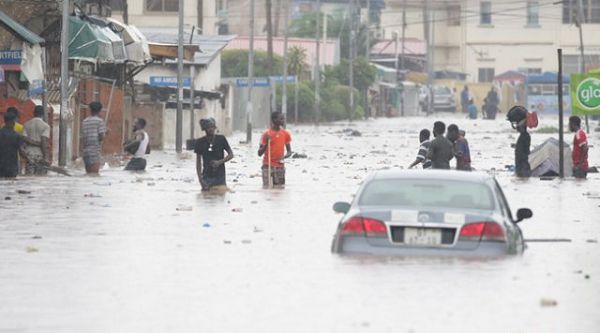
Floods: For how long?
Since 1960, Accra has experienced floods at most of its suburbs, which have destroyed properties worth millions of cedis and made thousands of people homeless.
One would have thought that after 65 years of nationhood, Accra’s major problem — floods after rainfall — would be a thing of the past.
Howbeit, this has not been the case, as city authorities continue to grapple with the yearly occurrence, during which the security agencies and the National Disaster Management Organisation (NADMO) try to rescue people marooned by the floods.
The past weekend has served as a stark reminder of our failure, as a people, to decisively deal with the floods.
While some argue that floods occur even in the advanced countries, the Daily Graphic posits that some of the floods we experience after just showers can be avoided with the right infrastructure and attitude
Many places in Accra got literally submerged under water after hours of torrential rainfall last Saturday, which left hordes of commuters and motorists stranded on the streets and shop owners and residents having to scoop water from their shops and homes.
This time, places not even noted for floods were not spared, thereby exposing the poor drainage system in Accra and sending a loud message that if we do not speak up when we see people building or developing structures at unauthorised places, it will come to haunt us.
This is not to say nothing has been done over the years to put the floods in check. Indeed, so much money has been pumped into dredging the Odaw drain which runs through the city, but little has changed.
So much sensitisation has gone on for people to desist from throwing rubbish into drains, especially when the rains come down, but our small gutters are still choked because our bye-laws have remained in the statute books.
Sad to say that we all know the problem, but both the authorities and residents pretend to be doing something to solve it, while bypassing the bold actions that need to be taken.
If it were not so, why would we still keep slums close to the main drain in the city — the Odaw — when it is very clear that it is those communities that keep polluting and silting the drain with their waste? Why won’t they be relocated?
As it is said, water will always find its level, but we continue to circumvent the laid-down procedures and build on water courses. That being the case, we should fully face the repercussions of that action.
When the floods come, we cry wolf and now point accusing fingers at people who have built on water courses. When the rains go, we carry on as if nothing has happened and wait for another period of flooding.
Interestingly, we find that it is rather the wetlands and places meant to be left alone for run off water that are sold to the highest bidder, thereby putting everyone at risk.
We cannot have our cake and eat it still. If we want to really deal with the floods, then we have to take the bull by the horns.
Accra, by nature, is low-lying, and impeding the water on its natural course with buildings simply means calling for floods.
Even cities in other jurisdictions which are surrounded and criss-crossed by water do not get flooded during days of rainfall because they are well drained and those cities are well planned.
Perhaps, it is time for our engineers to help solve Accra’s flooding nightmare, once and for all, by learning from other cities in the world that are well drained, getting to the drawing board and redesigning Accra, so that we can say bye-bye to Accra’s perennial floods.
Meanwhile, as we are immobilised by fear to crack the whip, we have to brace ourselves for more floods, as the Ghana Meteorological Agency has warned of more rains this year.
